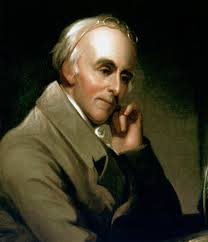
“Without religion, I believe that learning does real mischief to the morals and principles of mankind.” So said a man who knew what learning was all about: Benjamin Rush. Rush was a thinker of the American Enlightenment, a ground-breaking doctor in the field of medicine and a signatory of the Declaration of Independence. Rush is known today as the “Father of American Medicine”. He also was a fundamental founder of our nation.
Benjamin was born in 1746 to John Harvey Rush and his wife Susanna in a small town outside Philadelphia, Pennsylvania. His father died when he was young and he was sent to be educated by his uncle and aunt in Maryland. He was sent to a school where he studied under Reverend Samuel Finley. He then attended Princeton University and graduated in 1760 at the age of 14. He also studied to be a physician in Scotland. He returned in 1769 and established a medical practice in Philadelphia.
During the Revolution, Rush served as both doctor and politician. He represented Pennsylvania in the Continental Congress and signed the Declaration of Independence he was also influential in the writing of Thomas Paine’s pamphlet Common Sense. He also served in the field as an army physician.
After the Revolution, Rush continued to serve in his medical practice and he also served in various government positions including the treasurer of the U.S. Mint. He was also actively involved in Christian ministry and founded the African Methodist Episcopal Church with African-American, Richard Allen. Rush supported abolition and wrote an anti-slavery pamphlet in 1773.
Overall, Benjamin Rush was a revolutionary figure in American history. This is not only because of his important role in the Revolution itself but also because of his ground-breaking medical and social reforms.
The following are some quotes by Benjamin Rush.
“The only foundation for a useful education in a Republic is to be laid in religion. Without this there can be no virtue, and without virtue there can be no liberty, and liberty is the object and life of all Republican governments.”
“Where there is no law, there is no liberty; and nothing deserves the name of law but that which is certain and universal in its operation upon all the members of the community.”
